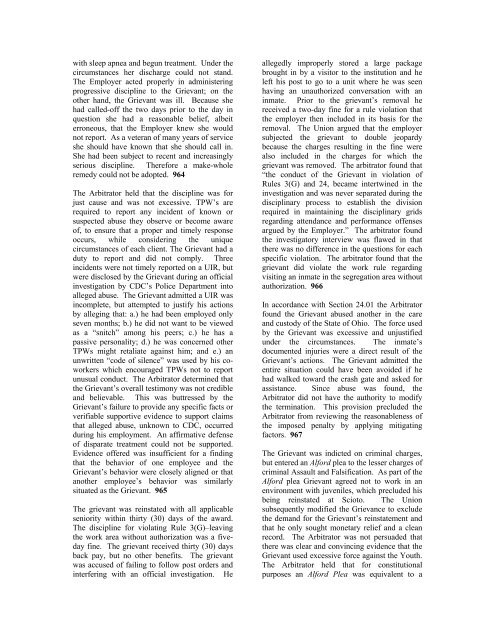by Contract Number (PDF) - OCSEA
by Contract Number (PDF) - OCSEA
by Contract Number (PDF) - OCSEA
You also want an ePaper? Increase the reach of your titles
YUMPU automatically turns print PDFs into web optimized ePapers that Google loves.
with sleep apnea and begun treatment. Under the<br />
circumstances her discharge could not stand.<br />
The Employer acted properly in administering<br />
progressive discipline to the Grievant; on the<br />
other hand, the Grievant was ill. Because she<br />
had called-off the two days prior to the day in<br />
question she had a reasonable belief, albeit<br />
erroneous, that the Employer knew she would<br />
not report. As a veteran of many years of service<br />
she should have known that she should call in.<br />
She had been subject to recent and increasingly<br />
serious discipline. Therefore a make-whole<br />
remedy could not be adopted. 964<br />
The Arbitrator held that the discipline was for<br />
just cause and was not excessive. TPW’s are<br />
required to report any incident of known or<br />
suspected abuse they observe or become aware<br />
of, to ensure that a proper and timely response<br />
occurs, while considering the unique<br />
circumstances of each client. The Grievant had a<br />
duty to report and did not comply. Three<br />
incidents were not timely reported on a UIR, but<br />
were disclosed <strong>by</strong> the Grievant during an official<br />
investigation <strong>by</strong> CDC’s Police Department into<br />
alleged abuse. The Grievant admitted a UIR was<br />
incomplete, but attempted to justify his actions<br />
<strong>by</strong> alleging that: a.) he had been employed only<br />
seven months; b.) he did not want to be viewed<br />
as a “snitch” among his peers; c.) he has a<br />
passive personality; d.) he was concerned other<br />
TPWs might retaliate against him; and e.) an<br />
unwritten “code of silence” was used <strong>by</strong> his coworkers<br />
which encouraged TPWs not to report<br />
unusual conduct. The Arbitrator determined that<br />
the Grievant’s overall testimony was not credible<br />
and believable. This was buttressed <strong>by</strong> the<br />
Grievant’s failure to provide any specific facts or<br />
verifiable supportive evidence to support claims<br />
that alleged abuse, unknown to CDC, occurred<br />
during his employment. An affirmative defense<br />
of disparate treatment could not be supported.<br />
Evidence offered was insufficient for a finding<br />
that the behavior of one employee and the<br />
Grievant’s behavior were closely aligned or that<br />
another employee’s behavior was similarly<br />
situated as the Grievant. 965<br />
The grievant was reinstated with all applicable<br />
seniority within thirty (30) days of the award.<br />
The discipline for violating Rule 3(G)–leaving<br />
the work area without authorization was a fiveday<br />
fine. The grievant received thirty (30) days<br />
back pay, but no other benefits. The grievant<br />
was accused of failing to follow post orders and<br />
interfering with an official investigation. He<br />
allegedly improperly stored a large package<br />
brought in <strong>by</strong> a visitor to the institution and he<br />
left his post to go to a unit where he was seen<br />
having an unauthorized conversation with an<br />
inmate. Prior to the grievant’s removal he<br />
received a two-day fine for a rule violation that<br />
the employer then included in its basis for the<br />
removal. The Union argued that the employer<br />
subjected the grievant to double jeopardy<br />
because the charges resulting in the fine were<br />
also included in the charges for which the<br />
grievant was removed. The arbitrator found that<br />
“the conduct of the Grievant in violation of<br />
Rules 3(G) and 24, became intertwined in the<br />
investigation and was never separated during the<br />
disciplinary process to establish the division<br />
required in maintaining the disciplinary grids<br />
regarding attendance and performance offenses<br />
argued <strong>by</strong> the Employer.” The arbitrator found<br />
the investigatory interview was flawed in that<br />
there was no difference in the questions for each<br />
specific violation. The arbitrator found that the<br />
grievant did violate the work rule regarding<br />
visiting an inmate in the segregation area without<br />
authorization. 966<br />
In accordance with Section 24.01 the Arbitrator<br />
found the Grievant abused another in the care<br />
and custody of the State of Ohio. The force used<br />
<strong>by</strong> the Grievant was excessive and unjustified<br />
under the circumstances. The inmate’s<br />
documented injuries were a direct result of the<br />
Grievant’s actions. The Grievant admitted the<br />
entire situation could have been avoided if he<br />
had walked toward the crash gate and asked for<br />
assistance. Since abuse was found, the<br />
Arbitrator did not have the authority to modify<br />
the termination. This provision precluded the<br />
Arbitrator from reviewing the reasonableness of<br />
the imposed penalty <strong>by</strong> applying mitigating<br />
factors. 967<br />
The Grievant was indicted on criminal charges,<br />
but entered an Alford plea to the lesser charges of<br />
criminal Assault and Falsification. As part of the<br />
Alford plea Grievant agreed not to work in an<br />
environment with juveniles, which precluded his<br />
being reinstated at Scioto. The Union<br />
subsequently modified the Grievance to exclude<br />
the demand for the Grievant’s reinstatement and<br />
that he only sought monetary relief and a clean<br />
record. The Arbitrator was not persuaded that<br />
there was clear and convincing evidence that the<br />
Grievant used excessive force against the Youth.<br />
The Arbitrator held that for constitutional<br />
purposes an Alford Plea was equivalent to a
















